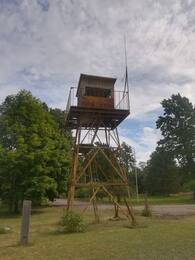Memories of the Kolka border area
Memories of Biruta Freimane, a resident of Kolka, about the border area.
I worked at the Kolka fish processing factory, the manager was Morozov. At first I worked in a sprat workshop, then in a workshop where fish was marinated in tomato sauce. I worked in fish processing companies all my life until retirement.
Border guards came to the workshop to help when the products were sent away to Riga and fish boxes had to be loaded into large cars. Most of the employees in the workshop were women, there were no men who could do such hard work. Then the call was called to help the border guards. To help them, they were given products again: oil, fish, whatever they could be given, because they could not already be paid.
There were border guards and sailors in Kolka. At first, the castle was located in the old manor house next to the church, the border guards had their own buildings on the very cape of Kolka.
The main thing was that you had to carry your passport all the time. We could leave Kolka at any time, but it was difficult for relatives, friends and acquaintances to enter us in the border area. Buses and cars were controlled by the border guards, they needed special passes, we called them propusus in Russian in order to enter the village. Every short distance on the roads there were checkpoints with slang booms in front. Border guards were on duty there.
The locals also had their own prohibitions, they could swim only on the side of the bay towards the Kolka House of Culture, walk along the seashore, go on the side of the big sea, for example to Vaide, they could only ask the border guards for permission through acquaintance. My husband worked at the post office and was quite familiar with the border guards. The man asked permission and we often went for a walk along the seashore to the village of Vaide and back on Sundays. However, once it happened that we were close to the Cape of Kolka, when two border guards with shuttles on our shoulders stop us, do not let us go, but make them pass through the whole village to the shed. Then they could sneak into the ground with shame. When the officer saw us, he laughed, praised the border guards and let us go.
When the autumn storms came, many people went to the big sea to read the amber behind the cape, because there they came much more than on the bay side. Then the officer had to ask permission, those who had not asked for permission were forced to leave and were not allowed to read.
The area behind the cape towards Ventspils was very strict, which was under increased control, there was a shooting range, trenches were built, there was training for border guards in shooting. Enhanced controls took place when border guards learned of a prisoner's escape or return from prison.
Jurmala was not illuminated in the dark, but large rays of light came from the lighthouse and the village was bright around the clock.
The border guards also had dogs, a dog named Ruslan, known throughout Kolka.
Related objects
Mazirbe Nautical School
The Soviet Border Guard Tower in this complex is one of the best preserved of its kind on the Latvian coast. Unfortunately, the condition of the buildings is poor, there is a rifle loading/unloading site on the site, and a drive and fragments of trenches have been salvaged.
The Coast Guard post was located in the former Marine School building. In the post-Soviet period, accommodation was offered in parts of the buildings.
The second tower of the Soviet Border Guard is located about 400 m from the beach, but unfortunately it is in a state of disrepair. However, the Mazirbe boat cemetery is located not more than 500 m from the beach tower towards Sīkrags.





